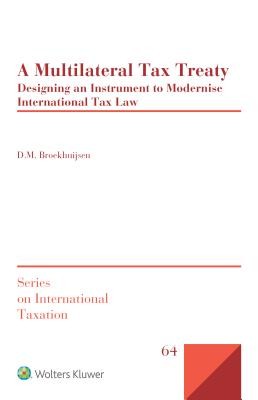
- We will send in 10–14 business days.
- Author: D M Broekhuijsen
- Publisher: Kluwer Law International
- ISBN-10: 9041198725
- ISBN-13: 9789041198723
- Format: 16.3 x 24.9 x 2.3 cm, hardcover
- Language: English
- SAVE -10% with code: EXTRA
Reviews
Description
Many states have set out to develop a multilateral tax instrument with the purpose of amending bilateral treaties in a quick and comprehensive fashion. The recent adoption by as many as a hundred jurisdictions of the Multilateral Convention to Implement Tax Treaty Related Measures to Prevent Base Erosion and Profit Shifting (the OECD Multilateral Instrument) is the most prominent step in this direction. This book provides not only a detailed analysis of the OECD Multilateral Instrument but also discusses in depth the far-reaching implications of the international tax reform currently under way.
The author shows how the BEPS Project has merely unveiled the problems related to bilateral tax relationships and articulates initiatives to ensure the sustainability of a multilateral consensus. Drawing on the fields of international law, international relations, and political science, he develops a design strategy, complete with draft clauses, that fundamentally transforms the way states cooperate in the field of international tax, effectively addressing such problems as the following:
- - the need for collective action;
- - the problem structure of multilateral tax cooperation;
- - the relevance of the OECD Model Tax Convention and Commentaries thereon;
- - the place, position and operation of the OECD Multilateral Instrument;
- - non-OECD member countries; and
- - treaty shopping.
The principled and pragmatic structural solution presented would allow policymakers to continuously adapt and respond to the rapidly evolving nature of the global economy. The author's original research and his recommendations for future development of the topic offer deeply informed guidance to policymakers, practitioners and other tax professionals, and academics.
EXTRA 10 % discount with code: EXTRA
The promotion ends in 17d.16:28:50
The discount code is valid when purchasing from 10 €. Discounts do not stack.
- Author: D M Broekhuijsen
- Publisher: Kluwer Law International
- ISBN-10: 9041198725
- ISBN-13: 9789041198723
- Format: 16.3 x 24.9 x 2.3 cm, hardcover
- Language: English English
Many states have set out to develop a multilateral tax instrument with the purpose of amending bilateral treaties in a quick and comprehensive fashion. The recent adoption by as many as a hundred jurisdictions of the Multilateral Convention to Implement Tax Treaty Related Measures to Prevent Base Erosion and Profit Shifting (the OECD Multilateral Instrument) is the most prominent step in this direction. This book provides not only a detailed analysis of the OECD Multilateral Instrument but also discusses in depth the far-reaching implications of the international tax reform currently under way.
The author shows how the BEPS Project has merely unveiled the problems related to bilateral tax relationships and articulates initiatives to ensure the sustainability of a multilateral consensus. Drawing on the fields of international law, international relations, and political science, he develops a design strategy, complete with draft clauses, that fundamentally transforms the way states cooperate in the field of international tax, effectively addressing such problems as the following:
- - the need for collective action;
- - the problem structure of multilateral tax cooperation;
- - the relevance of the OECD Model Tax Convention and Commentaries thereon;
- - the place, position and operation of the OECD Multilateral Instrument;
- - non-OECD member countries; and
- - treaty shopping.
The principled and pragmatic structural solution presented would allow policymakers to continuously adapt and respond to the rapidly evolving nature of the global economy. The author's original research and his recommendations for future development of the topic offer deeply informed guidance to policymakers, practitioners and other tax professionals, and academics.


Reviews